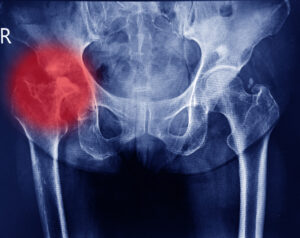Suffering a hip injury can be extremely painful and may prevent you from living your daily life as you usually would. You may wish to claim hip injury compensation if you’ve suffered this injury due to somebody else’s fault. This article will guide you on the process and eligibility to make a personal injury claim.
Key Points On Hip Injury Compensation
- You can claim hip injury compensation if you can establish that you suffered an injury due to somebody else breaching their duty of care.
- Generally, you will have three years from the accident date to begin the claiming process.
- You could claim compensation for both you injury and the financial losses it has caused you.
- You can claim hip injury compensation with a No Win No Fee solicitor from our panel.
To discuss your potential hip injury claim and receive free advice, you can contact one of our friendly advisors:
- Call us for free at 0800 4087 827
- Fill out our Contact Us form.
- Use our live chat to ask a question.
Browse Our Guide Or Jump To A Section
- How To Begin Your Hip Injury Compensation Claim
- Checking If You’re Eligible To Claim
- Common Hip Injuries You Can Claim For
- How Much Compensation You Can Claim
- More Information
How To Begin Your Hip Injury Compensation Claim
Before beginning your hip injury compensation claim, the first step you should take is to seek medical attention for your hip or pelvis injury. Depending on the severity of your injury, you may book an appointment with your GP or attend Accident & Emergency (A&E).
Other steps you should be aware of when making a hip injury compensation claim are set out below.
Finding The Evidence You Need
It’s important to collect evidence in order to strengthen your claim. Some examples of the evidence which could help are:
- Witness Details: They could provide a statement about the accident at a later date.
- Photographs of the accident site or your injuries.
- CCTV footage or dashcam footage of the accident.
- Medical Records: This should detail your injury and the treatment received for it.
- Accident Reports: This could either be a copy of the police report or an accident book.
Is There A Time Limit For Filing A Claim?
According to the Limitation Act 1980, you have three years to start a personal injury claim. The time limit commences from the date of the accident. However, there are certain cases where this time limit wouldn’t apply:
- Minors: If a minor suffers a hip injury, the time limit applies only once the minor turns 18. Therefore, once the minor turns 18, they can start their claim until they turn 21. However, if the minor’s parents want to claim on behalf of their child before their 18th birthday, they can do so by acting as a litigation friend.
- Diminished Mental Capacity: If the person injured has diminished mental capacity, no time limit will apply. Their friend or loved one could claim on their behalf as a litigation friend. However, the three-year time limit would apply if the individual regains their mental capacity and would run from this recovery date.
Finding A Reputable Solicitor
Although you are not required to work with a solicitor when making a hip injury compensation claim, doing so could be beneficial.
Our panel of solicitors have years of experience in handling various personal injury claims, including those being made for hip injuries. They could help you with:
- Collecting evidence to support your claim.
- Ensuring your claim is filed within the time limit.
- Communicating with the defendant.
- Calculating a compensation settlement for you.
What Are No Win No Fee Agreements?
If you have an eligible claim for hip injury compensation, you may be able to work with one of the No Win No Fee solicitors on our panel. Our panel works under a Conditional Fee Agreement (CFA) specifically. With this in place, you will not need to pay your solicitor for their work:
- Prior to the claim starting.
- While the claim is progressing.
- If the claim fails.
Your solicitor will take a legally fixed percentage from your compensation if your claim is a success as their success fee.
How Long The Claims Process Can Take
Every personal injury claim differs from the other, so there is no fixed time a claim could take. The timeframe for your claim could depend on the following factors:
- The complexity of your case.
- How long it takes to gather supporting evidence
- What type of accident you were injured in.
- Whether the other party accepts liability or not.
- If the claim needs to go to court.
Regardless of how long your claim may take, a solicitor from our panel could assist you every step of the way. Contact our advisors today to see if you could work with one of them.
Checking If You’re Eligible To Claim
You also need to know when you could be eligible to make a claim for hip injury compensation. In order to have a valid case, you need to meet the following criteria:
- Someone owed you a duty of care.
- They failed to uphold their duty of care.
- Due to this failure, you suffered a hip injury.
Some instances of when you are owed a duty of care and the accidents that could take place are set out below:
Accidents At Work
According to the Health and Safety at Work, etc. Act 1974, employers have a duty of care to ensure they take reasonable steps to prevent their employees from coming to harm while they are working. If the employer fails to fulfil this duty and an employee is injured, they could be eligible to make an accident at work claim. For example:
- Your employer provides you with a known defective ladder, which causes you to fall and sustain a hip fracture and a leg injury.
Road Traffic Accidents
All road users, per their duty of care, need to use the roads safely and responsibly. Additionally, they must also follow the rules and regulations set out within The Road Traffic Act 1988 and the Highway Code. Therefore, if you suffer an injury due to another road user breaching this duty, you could be eligible to make a road traffic accident claim. For example:
- You’re crossing the road as a pedestrian, and a speeding motorist collides with you. You fall and sustain a hip fracture as well as a back injury.
Public Place Accidents
The Occupiers’ Liability Act 1957 defines an occupier as a person or authority who controls a public place. Under this, an occupier is supposed to ensure the reasonable safety of all visitors to that place. If they fail to do so and you suffer an injury, you could sue them for an accident in a public place. For example:
- You’re going down the stairs at a library, and you fall due to defective handrails that had not been repaired or signposted. You sustain a hip fracture in the fall as well as a wrist injury.
To check the eligibility of your potential hip injury compensation claim, you can contact our advisors.
Common Hip Injuries You Can Claim For
There are various types of hip injuries that you could suffer in an accident at make a compensation claim for. Some examples include:
- Breaks and fractures.
- Soft tissue injuries.
- Dislocations.
Regardless of the type of hip injury you have suffered, if it was caused by someone breaching a duty of care they owed you, a compensation claim could be made.
Contact our advisors today to discuss your case.
How Much Compensation You Can Claim
Your hip injury compensation could include two types of damages:
- General Damages: You can claim these damages for your physical and psychological injuries.
- Special Damages: You can claim these damages for the financial losses suffered due to your injuries.
How Hip Injury Compensation Amounts Are Calculated
When general damages are being calculated, various factors will be taken into consideration, such as:
- What type of injury did you suffer?
- How severe is it?
- Did you suffer any other additional injuries?
- What treatment has been needed?
You may also be asked to attend an independent medical examination as part of the claims process. From this, a report will be generated about your injuries, and this can be used in conjunction with the Judicial College Guidelines (JCG) when your general damages payout is being calculated.
The JCG lists compensation guidelines for different physical and psychological injuries. We have listed the JCG’s entries relevant to hip injuries in the table below, aside from the first entry.
| Injury | Severity | Compensation Guidelines |
|---|---|---|
| Multiple Severe Injuries and Special Damages | Severe | Up to £500,000+ |
| Hip and Pelvis Injuries | Severe (i) | £95,680 to £159,770 |
| Severe (ii) | £75,550 to £95,680 | |
| Severe (iii) | £47,810 to £64,070 | |
| Moderate (i) | £32,450 to £47,810 | |
| Moderate (ii) | £15,370 to £32,450 | |
| Lesser (i) | £4,820 to £15,370 | |
| Lesser (ii) | Up to £4,820 |
The Difference Between Special And General Damages
While general damages compensate you for your injury, special damages compensate you for the financial losses they have caused. Examples could include:
- Medical expenses
- Loss of earnings
- Cost of care
- Costs incurred while modifying your house or car due to a disability
- Travel expenses
It should also be noted that special damages aren’t always awarded. Therefore, you should provide evidence of these losses in order to claim them such as receipts and invoices.
Contact Us
If you have any questions about claiming hip injury compensation, would like to receive free advice for your case or see if you could work with a No Win No Fee solicitor from our panel, you can contact our advisors:
- Call us for free at 0800 4087 827
- Fill out our Contact Us form.
- Use our live chat to ask a question.
More Information
Learn more about other types of claims we could help with:
- Information on claiming for a rear-end collision.
- Details on how to sue for an injury at a bus stop.
- Learn how to claim for a broken forearm caused by a workplace accident.
Here are some external links for further information:
- Guidance from the NHS on hip pain in adults.
- Information from the NHS on hip pain in children.
- Details on Statutory Sick Pay (SSP) from the government.
Thank you for reading this guide on how to sue for hip injury compensation.




